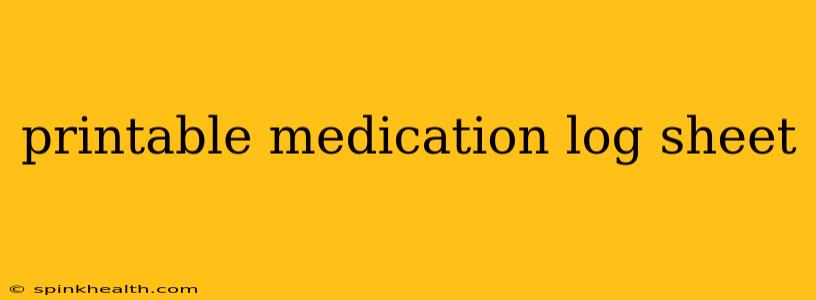Managing medications can feel like navigating a complex maze, especially when juggling multiple prescriptions or dealing with chronic conditions. Forgetting a dose, taking the wrong one, or accidentally double-dosing can have serious consequences. That's where a medication log sheet comes in – a simple yet powerful tool for taking control of your health and wellness. This guide will explore the importance of medication logs, answer common questions, and provide insights into finding the perfect printable medication log sheet for your needs.
Why Use a Medication Log Sheet?
Imagine this: You're at the doctor's office, and they ask about your medication regimen. You fumble through your purse, trying to remember each pill's name, dosage, and frequency. Sound familiar? A medication log sheet eliminates this hassle. It serves as a central hub for all your medication information, ensuring you're always prepared and informed. This isn't just about convenience; it’s about safety and proactive health management.
Benefits of using a printable medication log sheet include:
- Improved Medication Adherence: By clearly tracking your medications, you reduce the chances of missed or forgotten doses.
- Enhanced Communication with Healthcare Providers: Providing your doctor with accurate medication information leads to better care and fewer potential drug interactions.
- Reduced Risk of Errors: A clear log minimizes the risk of accidental overdosing or taking the wrong medication.
- Simplified Organization: Keeping track of multiple prescriptions becomes manageable, reducing stress and confusion.
What Information Should Be Included on My Medication Log Sheet?
A comprehensive medication log sheet should include crucial details to ensure accuracy and effectiveness. Here are the essential elements:
- Medication Name: The full name of the medication, as it appears on the prescription label.
- Dosage: The amount of medication to be taken per dose (e.g., 10mg, 500mg).
- Frequency: How often the medication should be taken (e.g., twice daily, once a week).
- Route of Administration: How the medication is taken (e.g., oral, topical, injection).
- Start Date: The date you began taking the medication.
- End Date (if applicable): The date you are scheduled to finish taking the medication.
- Notes: Space for additional comments, such as side effects experienced or any adjustments made to the dosage or schedule.
- Physician's Name and Contact Information: Crucial for quick reference in case of any queries.
- Pharmacy Name and Contact Information: Helpful in case of refill inquiries or questions about the medication.
What Types of Printable Medication Log Sheets Are Available?
The beauty of printable medication log sheets is their versatility. You can find various templates catering to specific needs. Some popular types include:
- Simple Medication Log: This basic format covers the essential information, ideal for those managing a few medications.
- Detailed Medication Log: Includes extra space for noting side effects, dosage adjustments, and other relevant details.
- Medication Log with Multiple Medications: Designed to track multiple medications simultaneously, with separate sections for each.
- Pediatric Medication Log: Specifically designed for children, often including additional information relevant to child health.
- Medication Log with Blood Sugar/Blood Pressure Monitoring: Combining medication tracking with other vital health metrics.
Where Can I Find Printable Medication Log Sheets?
Many websites offer free printable medication log sheets. A quick online search for "printable medication log sheet" will yield numerous results. You can also find them on healthcare websites, patient advocacy groups, or pharmacy websites. Always choose a reputable source to ensure accuracy and reliability. Remember, customizing a template to better fit your specific needs is perfectly acceptable.
How Do I Use a Printable Medication Log Sheet Effectively?
Using a medication log sheet effectively is key to reaping its benefits. Here are a few tips:
- Consistency is Key: Make it a habit to update your log each time you take medication.
- Accuracy Matters: Double-check all the information to ensure accuracy.
- Keep It Handy: Place your log in a convenient location, such as your medicine cabinet or purse, for easy access.
- Review Regularly: Review your log periodically to identify patterns, potential issues, or changes in your medication regimen.
- Share with Healthcare Providers: Bring your completed log to your doctor or pharmacist appointments.
Is it Necessary to Use a Printable Medication Log Sheet?
While not legally mandated, using a medication log sheet is highly recommended, especially for those managing multiple medications, experiencing cognitive changes, or concerned about medication adherence. It's a proactive step towards better health management and minimizes the risks associated with medication errors. It's a simple tool that can significantly enhance your overall health and well-being. Remember, taking charge of your health is a journey, and a medication log is a valuable companion along the way.

